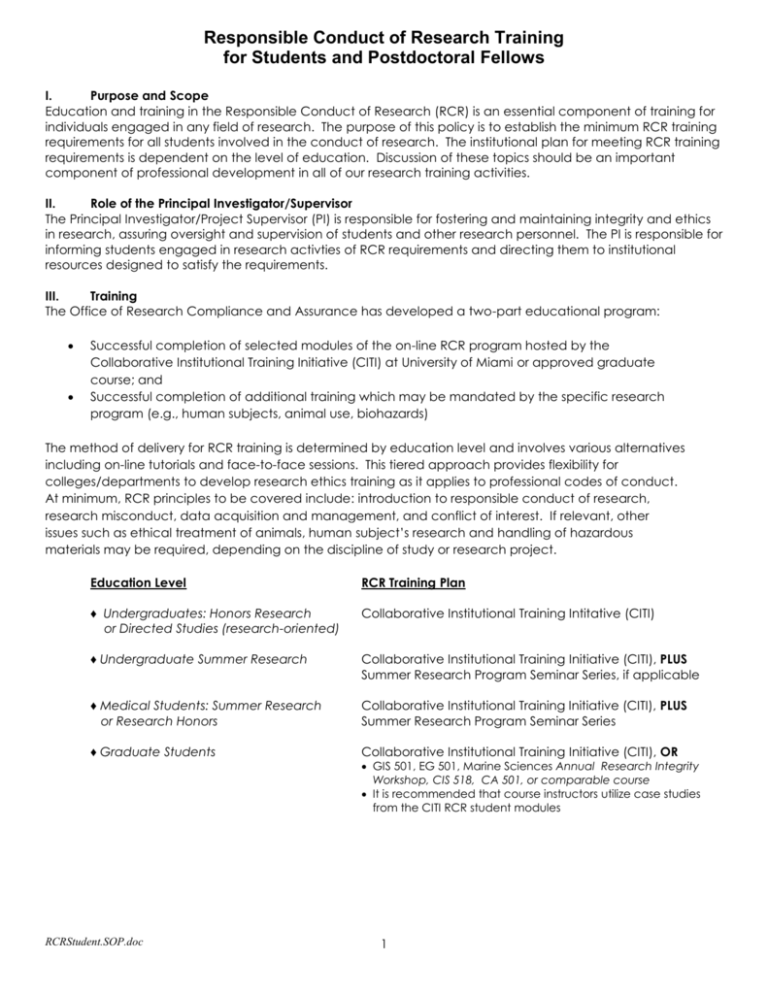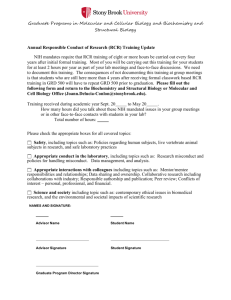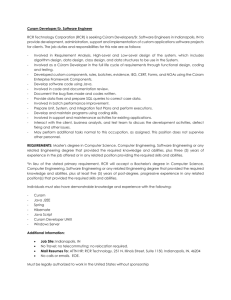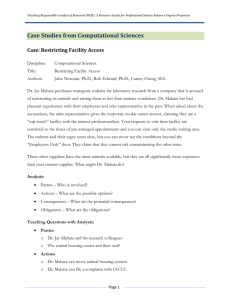Requirements for Possession of Exempt Quantities of
advertisement

Responsible Conduct of Research Training for Students and Postdoctoral Fellows I. Purpose and Scope Education and training in the Responsible Conduct of Research (RCR) is an essential component of training for individuals engaged in any field of research. The purpose of this policy is to establish the minimum RCR training requirements for all students involved in the conduct of research. The institutional plan for meeting RCR training requirements is dependent on the level of education. Discussion of these topics should be an important component of professional development in all of our research training activities. II. Role of the Principal Investigator/Supervisor The Principal Investigator/Project Supervisor (PI) is responsible for fostering and maintaining integrity and ethics in research, assuring oversight and supervision of students and other research personnel. The PI is responsible for informing students engaged in research activties of RCR requirements and directing them to institutional resources designed to satisfy the requirements. III. Training The Office of Research Compliance and Assurance has developed a two-part educational program: Successful completion of selected modules of the on-line RCR program hosted by the Collaborative Institutional Training Initiative (CITI) at University of Miami or approved graduate course; and Successful completion of additional training which may be mandated by the specific research program (e.g., human subjects, animal use, biohazards) The method of delivery for RCR training is determined by education level and involves various alternatives including on-line tutorials and face-to-face sessions. This tiered approach provides flexibility for colleges/departments to develop research ethics training as it applies to professional codes of conduct. At minimum, RCR principles to be covered include: introduction to responsible conduct of research, research misconduct, data acquisition and management, and conflict of interest. If relevant, other issues such as ethical treatment of animals, human subject’s research and handling of hazardous materials may be required, depending on the discipline of study or research project. Education Level RCR Training Plan ♦ Undergraduates: Honors Research or Directed Studies (research-oriented) Collaborative Institutional Training Intitative (CITI) ♦ Undergraduate Summer Research Collaborative Institutional Training Initiative (CITI), PLUS Summer Research Program Seminar Series, if applicable ♦ Medical Students: Summer Research or Research Honors Collaborative Institutional Training Initiative (CITI), PLUS Summer Research Program Seminar Series ♦ Graduate Students Collaborative Institutional Training Initiative (CITI), OR RCRStudent.SOP.doc GIS 501, EG 501, Marine Sciences Annual Research Integrity Workshop, CIS 518, CA 501, or comparable course It is recommended that course instructors utilize case studies from the CITI RCR student modules 1 ♦ Postdoctoral Fellows Collaborative Institutional Training Initiative (CITI), PLUS RCR on the Pathway to Independence (College of Medicine and Mitchell Cancer Institute only); Conducted by the COM Office of Faculty Affairs and the Office of Research Compliance and Assurance To access the CITI RCR Student modules, go to: http://www.citiprogram.org/ CITI training, if required, must be completed no later than three months after the start of the research project. For students whose participation is limited to summer research, CITI training is expected to be completed within the time expended on the project. For graduate students or postdoctoral fellows, an approved graduate course on RCR or an RCR workshop should be completed within the first year of training. IV. Document Retention Documentation of the online CITI training should be maintained by the student and the PI for a minimum of three years. V. Compliance and Oversight The Office of Research Compliance and Assurance is responsible for implementing and monitoring compliance with the plan. Additionally, in order to validate compliance with the NSF RCR training requirements, the Office of Research Compliance and Assurance will audit the process 3 months after project award and then on a successive, yearly basis to verify that all NSF-funded research personnel have documented completion of RCR training or ongoing education. NSF FastLane award documents will be reviewed the first of each month to identify NSF funded projects involving support for undergraduate/graduate students and postdoctoral fellows. VI. NSF vs. NIH RCR requirements NSF RCR training requirements differ from NIH training requirements. NSF requires that any student or postdoctoral researcher supported by NSF receive RCR training, beginning with proposals submitted on or after January 4, 2010. Specific requirements apply for NSF funded students, as documentation should be kept for at least three years after grant close out. As part of the award close out process, the Office of Grants Administration will verify/collect RCR training documentation for the NSF funded project. NIH requires only those individuals receiving support through research training grants, indivudal fellowship awards, career development awards, research education grants, dissertation research grants or other grant programs with a training component to undergo RCR training. Furthermore, NIH requires the inclusion of faceto-face discussions which may or not be supplemented by on-line training. Note that the University of South Alabama will require RCR training for ALL students involved in research activities conducted within the purview of the University, regardless of funding source. VII. Online Resources The following sites contain case studies and learning modules that course instructors may utilize in their course curricula. Ethics in Science and Engineering National Clearinghouse- http://www.umass.edu/sts/digitallibrary/ Online Ethics Center- http://www.onlineethics.org/ Office of Research Integrity RCR educational resources - http://ori.dhhs.gov/ RCRStudent.SOP.doc 2



